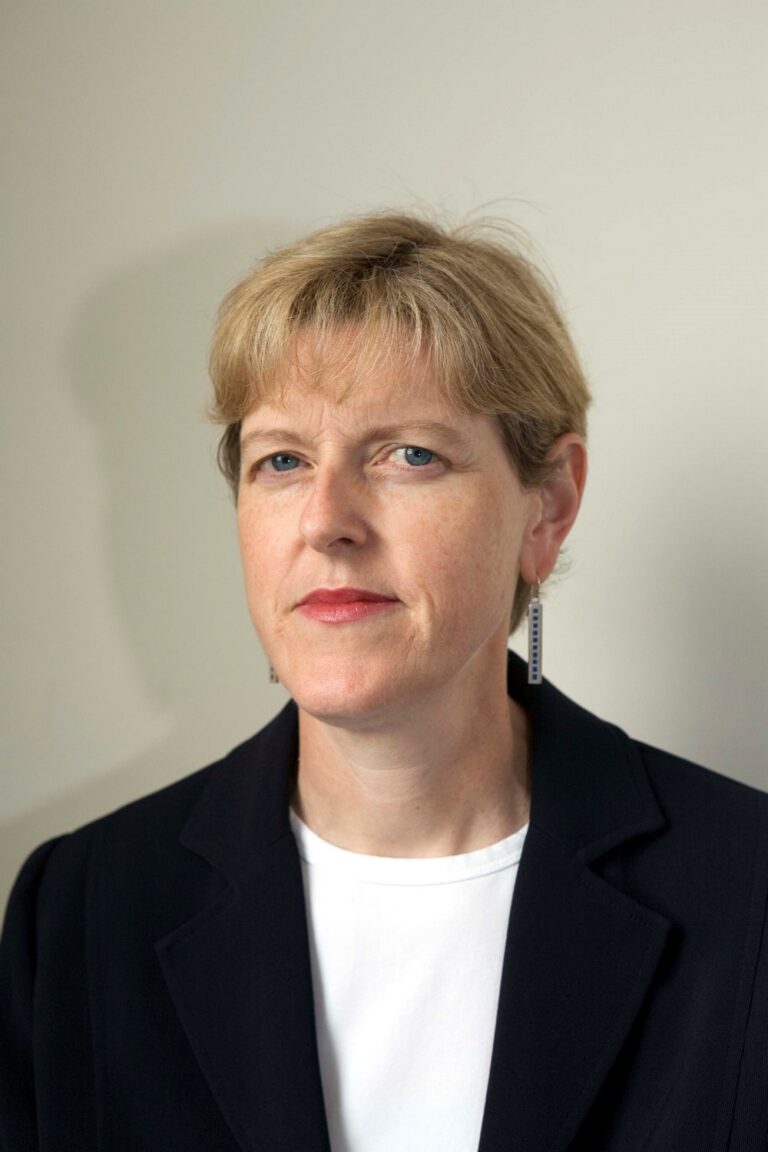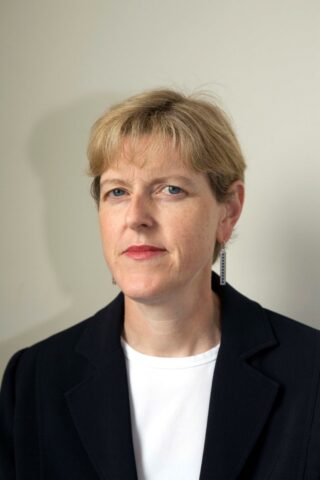- Entry type: Person
- Entry ID: AWE5608
Hunter, Rosemary
(1962 – )
- Occupation Lawyer, Legal academic
Summary
Rosemary Hunter is a feminist legal academic who, through her research, writing, leadership and activism has worked to support women in legal and academic careers, as well as to promote more generally women’s equality, women’s access to justice, and justice for women.
Go to ‘Details’ below to read a reflective essay written by Rosemary Hunter for the Trailblazing Women and the Law Project.
Details
The following additional information was provided by Rosemary Hunter and is reproduced with permission in its entirety.
Rosemary Hunter was born in Sydney but moved to Melbourne with her parents as a child. She attended Montmorency Primary School (1967-73) and Presbyterian Ladies’ College (1974-79). During 1980 she took a gap year and travelled around the UK, before returning to study Arts part-time at Melbourne University, while working to support herself as a Junior Typist in the University’s English Department. In 1982 she switched to Arts-Law at Melbourne, and in 1983 moved to full-time study, with the benefit of free higher education and a student living allowance on which it was almost possible to live. She supplemented her income with freelance typing work and also volunteered on the literary magazine Scripsi, through which she met the poet Laurie Duggan, whom she married in 1987. She completed University in 1988 with first class honours in Arts (History with English) and 2A honours in Law. During her final years at Law School she finally developed an interest in the study of Law, helped by inspirational teachers such as Hilary Charlesworth, with whom she studied international human rights law and for whom she worked as a research assistant, and Jenny Morgan, who had just introduced a course in feminist legal theory to Melbourne Law School.
With no interest in practising law but an aptitude for research, Hunter was offered a post as a Research Fellow in the Melbourne Law School, and the following year was appointed to a Lectureship in Law. She lectured at Melbourne from 1990-1997, but during that time took a year’s leave to undertake a Master’s degree and enrol in a doctorate at Stanford University in the USA. Stanford had been one of the centres of the Critical Legal Studies movement, and her supervisor was the well-known feminist legal scholar Deborah Rhode. After the year away Hunter returned to Melbourne to undertake fieldwork for her doctorate, spending many hours sitting at the back of Magistrates Courts and the Family Court observing domestic violence cases. Subsequent moves interrupted work on her thesis, and she did not finally complete the doctorate until 2006.
In 1997-98 Hunter took a further two years’ leave of absence to take up the post of Principal Researcher at the Justice Research Centre (JRC) in Sydney. The JRC was an independent, interdisciplinary, public-interest research organisation and she relished the opportunity to devise and conduct large empirical research projects, learn new research skills, and work with a team from a wide variety of disciplinary backgrounds. At the conclusion of that period, rather than returning to Melbourne, she moved to Griffith University in Brisbane, where she became the Director of the Law Faculty’s Socio-Legal Research Centre (2000-2002) and subsequently Dean of Law (2003-2004). Looking for a new challenge, she decided to move to the UK in 2006, working first at the University of Kent (2006-2014) as a member of the AHRC Centre for Law, Gender and Sexuality, and afterwards at Queen Mary University of London (2014-present).
Throughout her academic career Hunter has actively engaged in university equality and diversity activities. At Melbourne she founded the position of Koori student liaison officer and was a member and sometime Chair of the Law Faculty’s Equal Opportunity Committee, as well as being a member of the University’s Union Affirmative Action Consultative Group, Equal Opportunity Standing Committee, Aboriginal Education Committee and Students with Disabilities Advisory Working Group. At Griffith she chaired the Law Faculty’s Equity Committee and was a member of the University’s Equity Committee and the Task Group on Women in Senior Academic Positions which succeeded in almost doubling the number of women professors employed by the University over a two year period. In recognition of her expertise in this area she was appointed Acting Pro-Vice Chancellor (Equity) for a short period. At both universities she and colleagues undertook significant research projects concerned to identify and address the needs of a diverse student body.
In Australia Hunter was also actively involved in women lawyer organisations – Feminist Lawyers in Melbourne and Women Lawyers in Queensland. In 2002 she was named Queensland Woman Lawyer of the Year. She played a significant role in supporting the former Chief Magistrate of Queensland, Diane Fingleton, who was wrongly convicted and imprisoned for alleged misfeasance in her handling of personnel matters within the Queensland magistracy. Hunter wrote articles and gave media interviews expressing the view that Fingleton was a victim of gendered injustice and would not have been treated the same way if she had been a man.
Hunter’s early teaching and research focused on anti-discrimination law, particularly sex discrimination and pay equity. Her first book, Indirect Discrimination in the Workplace (Federation Press, 1992) remains the only book-length treatment of indirect discrimination internationally, and she was also the first to investigate the process and outcomes of conciliation in sex discrimination cases. She made numerous law reform submissions on equal opportunity and anti-discrimination law, including a successful argument for the redrafting of the definition of indirect discrimination in the federal Sex Discrimination Act 1984. Her work on pay equity included membership of the National Pay Equity Coalition, contributions to the NSW and Queensland Pay Equity Inquiries, and collaborative research on the reproduction of pay inequity in emerging occupations. In 1999 she was invited to give the inaugural Clare Burton memorial lecture series, with her lecture addressing historical attempts to achieve pay equity for Australian women and the promising new approach to the undervaluation of women’s work adopted by the recent state pay equity inquiries.
A second strand of Hunter’s research has been on access to justice, beginning with studies on legal aid and litigants in person in family law cases, and access to justice for discrimination complainants commenced while working at the Justice Research Centre. At Griffith she continued to work on legal aid, including an ARC-funded project on service innovations in legal aid provision, consultancies for National Legal Aid and the Commonwealth Attorney-General’s Department, and a study in collaboration with Legal Aid Queensland which sought to identify why some of the most disadvantaged women were denied legal aid for family law, domestic violence and discrimination matters, which resulted in changes to policy and practice. Work on this theme has continued in the UK with a team project on litigants in person in private family law proceedings for the Ministry of Justice, training for family judges on litigants in person, and research and submissions related to major legal aid cuts in 2013. In 2012 she was invited to become a Council member of JUSTICE, a prominent law reform and human rights organisation working to strengthen the justice system in the UK.
A third, overlapping strand of research has been on family law, family justice processes and domestic violence. Her doctoral thesis investigated the implementation of feminist law reforms around domestic violence and the experiences of women seeking to invoke these laws in State Magistrates Courts and the Family Court of Australia. The thesis was subsequently published as Domestic Violence Law Reform and Women’s Experience in Court: The Implementation of Feminist Reforms in Civil Proceedings (Cambria Press, 2008). At Griffith she undertook evaluations of Legal Aid Commissions’ primary dispute resolution programs in family law and of the Family Court of Australia’s Children’s Cases Pilot Program. In the UK she was invited to join the Kent Family Justice Council (subsequently Family Justice Board), as well as the national Family Justice Council’s Domestic Abuse Committee. For the latter she undertook research with Adrienne Barnett on the courts’ approach to allegations of domestic violence in residence and contact cases. Among other things, this research contributed to revisions to the Domestic Violence Practice Direction which specifies the procedures to be followed in cases raising allegations of violence. With colleagues at the University of Exeter, she also undertook a three-year study of out-of-court dispute resolution processes in family cases, ‘Mapping Paths to Family Justice’, funded by the Economic and Social Research Council, which has influenced policy and practice on family dispute resolution.
A fourth strand of research has been on women in the legal profession and the judiciary. In 1997-98, Hunter and Helen McKelvie undertook research for the Victorian Bar Council on barriers to the advancement of women at the Victorian Bar. Their report, Equality of Opportunity for Women at the Victorian Bar (1998) has had an ongoing impact in terms of its recommendations on briefing practices, the culture of the Bar and attrition rates. Hunter’s support for Diane Fingleton sparked an interest in women judges and judicial appointments. In the UK she was one of the organisers of the pioneering Feminist Judgments Project, a project which took its cue from the Women’s Court of Canada in rewriting judgments from a feminist perspective, and which has in turn been emulated in other parts of the world including Australia, Ireland, the USA and New Zealand, and in international law. Hunter has co-edited two of the books arising from these projects: Feminist Judgments: From Theory to Practice (with Clare McGlynn and Erika Rackley, Hart Publishing, 2010) and Australian Feminist Judgments: Righting and Rewriting Law (with Heather Douglas, Francesca Bartlett and Trish Luker, Hart Publishing, 2014). She has published further theoretical and empirical work on feminist judging, and is also a member of the Equal Justices Initiative, a lobby group whose aim is to promote the equal participation of men and women in the judiciary in England and Wales.
Digital resources
Published resources
-
Resource
- Equality of opportunity for women at the Victorian Bar: A report to the Victorian Bar Council, Hunter, Rosemary and McKelvie, Helen, 1998, https://www.vicbar.com.au/wba/Hunter_McKelvie_Report.pdf
-
Site Exhibition
- Australian Women Lawyers as Active Citizens, http://www.womenaustralia.info/lawyers/biogs/AWE5608b.htm
